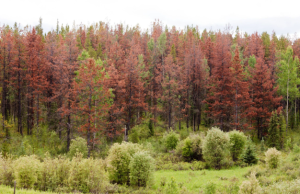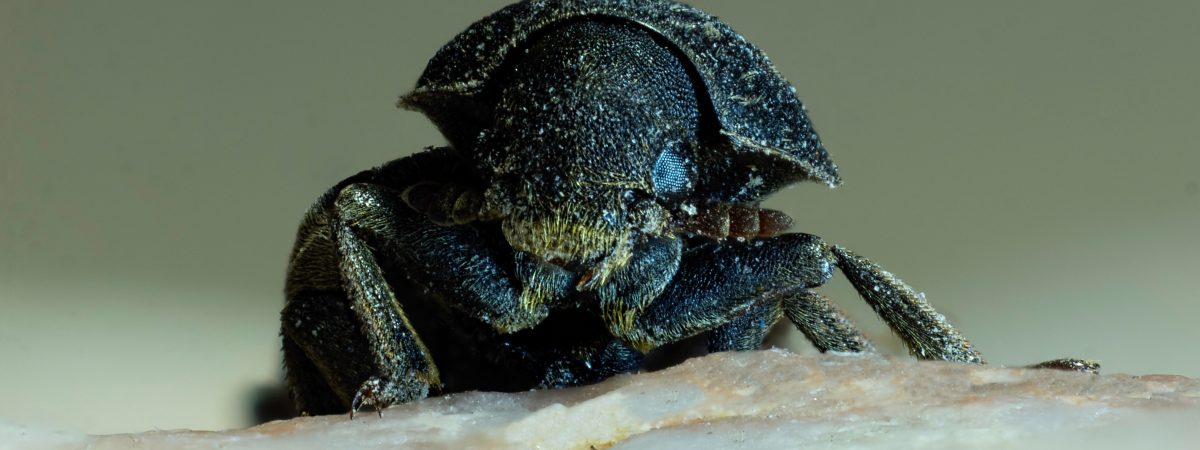People from all across the country come to Denver because of the scenic views and lush forests, but unfortunately, a great deal of the forests in the area are being destroyed by mountain pine beetles. Do you have mountain pine beetles in your trees? If so, what Denver tree services will you need?
What is a Mountain Pine Beetle?
The mountain pine beetle (MPB) is an insect native to western North American woodlands. Many people refer to them as the Black Hills beetle or the Rocky Mountain pine beetle. MPB typically affects lodgepole, ponderosa, Scotch, and limber pines, and occasionally bristlecone and piñon pines. It should be noted that when beetle populations explode, all pines in Colorado can be susceptible to an MPB infestation, even ornamental pine trees.
How Do Mountain Pine Beetles Harm Trees?
Millions of trees may be lost as a result of an MPB infestation. Outbreaks occur regardless of property borders and are be present in wilderness regions, mountain communities, and backyards. Windbreak or landscape pines can succumb to insects introduced in contaminated firewood from several miles away. These little bugs, which are about the size of a grain of rice, dig their way into fully-grown pine trees. Once the beetles are inside the trees, they begin to lay eggs, which disrupts the tree’s ability to send and receive nutrients. Even though the tree will try to flush out the beetles with pitch, which is a sticky, sap-like substance, the beetles usually end up killing the tree they have infested. Unfortunately, if there are outbreak conditions, there may be enough beetles that emerge from an infested tree and go on to kill several more trees the next year. Learn more about the mountain pine beetle epidemic here.
How to Identify a Mountain Pine Beetle Problem

Although it’s rare that you would actually see the beetles, there are other signs of an infestation. If you think you may have a MPB infestation, there are some tell-tale signs you can look for.
- The trunk of the tree may have “pitch tubes”, or popcorn-shaped masses of resin, that signal the start of a beetle tunnel. This indicates the tree is trying to flush out beetles from within. If the pitch tubes are white or clear, it means the tree has successfully gotten rid of the beetles, but if they are brown or red in color, this means the beetles have infested the tree.
- You may notice boring dust on the ground near the tree base and in the bark’s crevices.
- Woodpeckers may be feeding on the trunk, which can be evident if patches of bark are missing.
- If the MPB attack happened 8-10 months ago, the foliage throughout the tree crown may be turning red or yellow.
- A certain sign of a MPB problem is the presence of eggs, larvae, pupae, and/or adults. To check for this you will need a hatchet to remove bark and check underneath it. Once you’ve done this, you may also be able to see tunnels, or galleries, made by the adults and larvae.
- Bluestained sapwood is also a sign of a MPB problem.
The Danger of MPB Infested Trees
Falling Trees
The effects of mountain pine beetle infestations are devastating. Trees that have died from a MPB infestation are at risk of falling at a moment’s notice, so you must be careful to avoid trees that have been infested with mountain pine beetles. Make sure you do not have your car parked anywhere near these trees in case they fall. You should avoid standing around these trees at all times, but especially if it is windy, since the wind can cause dead trees to fall over.
Fire Hazards
Trees that have been infested by mountain pine beetles are also a huge fire hazard. In fact, the trees are considered fire hazards for up to two years after an infestation, but the time will vary depending on how long it takes for the tree to shed its red needles. If you notice some of your trees are dead because of an infestation, it’s essential that you call a tree removal service as soon as possible.
Can Mountain Pine Beetles Be Controlled?
Nature does its best to control MPB infestations by way of woodpeckers and other insects, like clerid beetles, that feed on adults and larvae under the bark. However, when there are large outbreaks, it can be challenging for the circle of life to take over effectively. There are other options for managing MPB including:
Removing Infected Trees
Areas that are frequently attacked by MBP and other insects would typically be the first candidates for removal. Tree removal should be done only after consulting a professional and confirming an infestation has taken place.
Preventative Insecticide Sprays
Preventing a MPB infestation by using insecticide spray may be effective. Formulas containing pyrethroids that are registered and tested for effectiveness can be used on high-value trees near businesses, homes, and recreational areas to reduce the likelihood of an attack. Always read labels before spraying any insecticides and consult with a professional if you are unsure.
Pheromone Packets
Using pheromone packets containing verbenone has been known to interfere with the attraction of incoming beetles and may be effective in reducing attacks on pine trees.
Solar Treatments
This type of treatment is done by felling the affected trees, cutting them into logs, stacking the logs, and covering them with clear plastic in an area that gets full sun. This creates a condition that MPB cannot survive.
Use Trap Trees
Recently emerged beetles can be trapped using “trap trees”. Once these designated trees become infested, they will be removed and destroyed along with the beetles that are still inside.
Get Help from Splintered Forest
If you believe your trees have been infested, contact a Denver tree service company as soon as possible. Splintered Forest is a leading fire mitigation and tree service provider serving the Denver area and mountain communities. We are committed to delivering the best service in the industry. Our skilled crew includes an ISA Certified Arborist, experienced tree climbers and expert tree fellers who can expertly assess and address your MPB problem. Contact us today to schedule your free, no obligation estimate. Learn more about Splintered Forest and all the tree services we offer and our crew.

